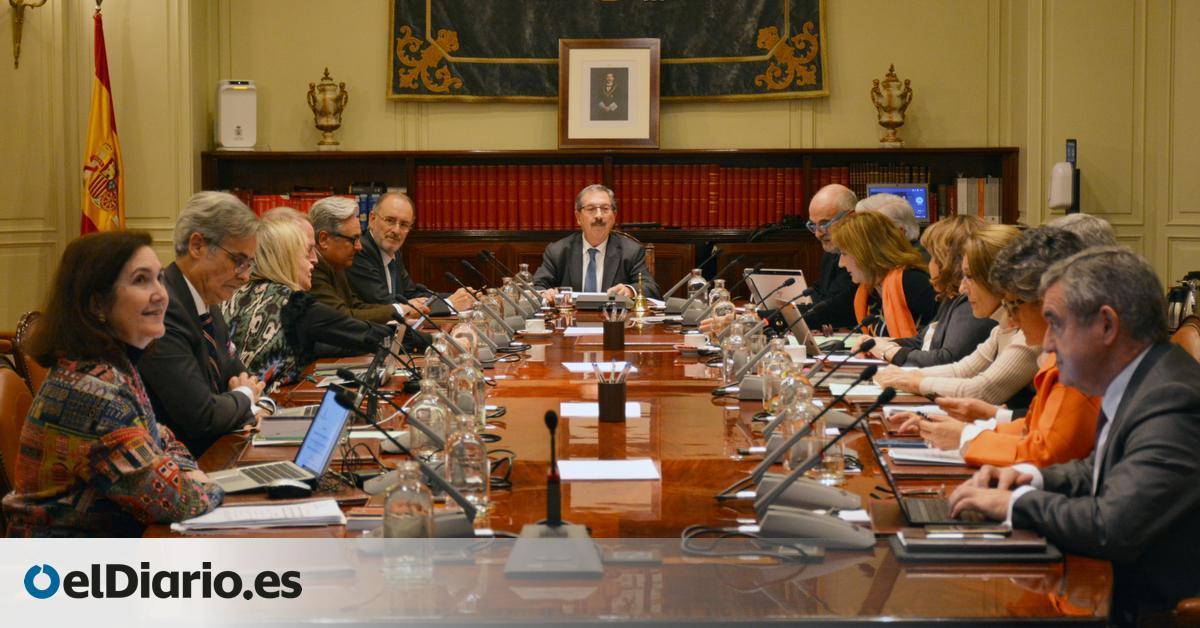
The General Council of the Judiciary (CGPJ), which has been in office for almost five years, enters fully into the debate on the hypothetical amnesty for those prosecuted by the process. Eight members elected at the time at the proposal of the PP will request this Thursday the holding of an extraordinary plenary session in which they ask for the approval of an institutional declaration that is very critical of the possibility that the PSOE and the pro-independence forces address the final shelving of the process through of an amnesty.
The proposed text charges against the acting president, Pedro Sánchez, and states that the hypothetical amnesty turns the independence of the courts “into a chimera” and represents the “abolition of the rule of law.” All of this, despite the fact that at the moment there is no draft or preliminary text—at least, that has been made public—on any legal initiative to decriminalize the causes that derive from October 1, 2017.
The members who subscribe to this petition, to which elDiario.es has had access, are Gerardo Martínez Tristán, José María Macías, José Antonio Ballestero, Nuria Díaz Abad, Juan Manuel Fernández, Juan Martínez Moya, Carmen Llombart and María Ángeles Carmona. The CGPJ regulations establish that it is enough for the president to decide or five members to request it so that a plenary session must be convened within three days following the request. The will of the conservative members is that this meeting be held next Monday, although the determination of the date corresponds to the president, also conservative Vicente Guilarte.
The PP’s blockade of the renewal of the governing body of the judges has allowed the institution to continue functioning with a composition inherited from the last legislature of Mariano Rajoy, when the PP governed with an absolute majority: ten conservative members and six progressive members. It is a distribution that has been updated with the circumstances that have occurred in recent years – retirements, resignations, a death… – but that maintains a distribution of forces that has nothing to do with the parliamentary reality that the ballot boxes have subsequently drawn.
For the aforementioned institutional declaration to be approved, it requires the vote in favor of nine members of the plenary session. At the moment, it is subscribed by eight members, so everything depends on it being able to reconcile some more support within the conservative bloc and even the minority progressive sector.
The argument that the conservatives use to demand the convening of this extraordinary session is that Sánchez has already publicly referred to the amnesty. He did so on October 28, when he defended the measure “in the name of Spain and coexistence” before the Federal Committee of the PSOE.
The signatory members believe, however, that the amnesty will have “consequences that are detrimental to the real interest of Spain” and accuse Sánchez of “confusing the interest of Spain” with his personal interest in “avoiding the hypothetical formation of party governments of one ideology different from yours.” They also add that the position they attribute to the acting head of the Executive is “manifestly incompatible with political alternation” and “flatly incompatible with the principle of the rule of law.”
The proposed declaration makes these considerations “even outside the general debate on the viability” of amnesties within the framework of our Constitution, which they also deny. And they do so based on three main arguments. First, because they consider that “it is not compatible with the principle of the rule of law (…) that political leaders are exempt from answering for their crimes before the courts” to “obtain the personal and political benefit” of an aspiring president. . Second, “because it means generating a legally irresponsible and unpunished caste.” And, third, because “the independence of the courts is violated in its most basic aspect.”
The movement of these eight members coincides with the critical reactions that the most conservative sectors of the judiciary and the prosecution have already expressed in recent weeks. Also the interim president of the CGPJ, who does not sign this petition, has questioned the amnesty “with no other justification than the mere electoral situation.”
Source: www.eldiario.es

